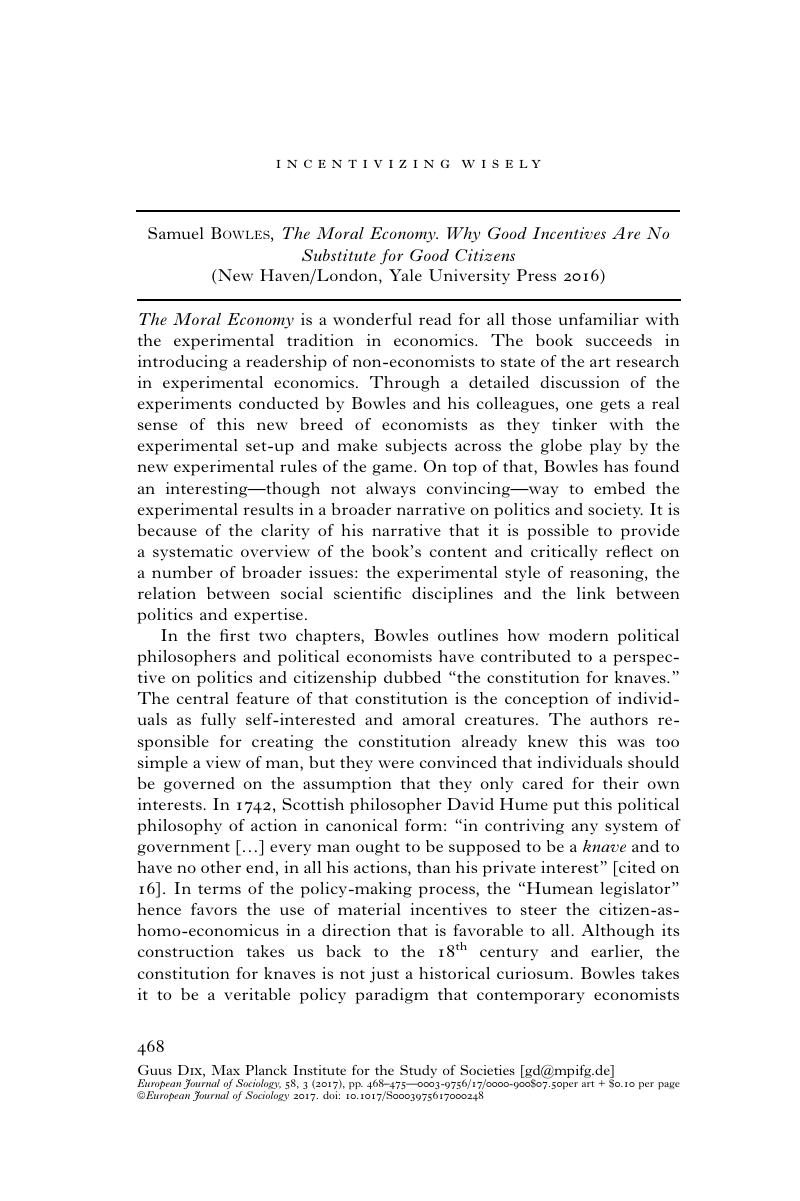No CrossRef data available.
Published online by Cambridge University Press: 04 December 2017

1 Kyu Sang Lee, 2016, “Mechanism Designers in Alliance: A Portrayal of a Scholarly Network in Support of Experimental Economics”, History of Political Economy, 48 (2): 191-223.
2 Pierre Bourdieu, 1984, Distinction: a Social Critique of the Judgment of Taste (Cambridge, MA, Harvard University Press).
Arlie Russel Hochschild, 2016, Strangers in their Own Land: Anger and Mourning on the American Right (New York, The New Press).
Jens Beckert and Patrik Aspers, 2011, The Worth of Goods: Valuation and Pricing in the Economy (Oxford, Oxford University Press).
3 Michel Callon, 1998. The Laws of the Markets (Oxford, Blackwell).
Donald MacKenzie, Fabian Muniesa and Lucia Siu, 2007. Do Economists Make Markets? On the Performativity of Economics (Princeton, Princeton University Press).
Trevor Pinch and Richard Swedberg, 2008, Living in a Material World: Economic Sociology Meets Science and Technology Studies (Cambridge, Mass, MIT Press).
4 Daniel Hirschman and Elisabeth P. Berman, 2014, “Do economists make policies?: On the political effects of economics”, Socio-economic review, 12 ; H. 14, S. 779-811.
5 Kieran Healy, 2017, “Fuck Nuance”, Sociological Theory, 35 (2): 118-127.
6 Colin Crouch, 2011, The Strange Non-Death of Neoliberalism (Cambridge, Polity Press).
Frank Dobbin and Jiwook Jung, 2010, “The Misapplication of Mr. Michael Jensen: How Agency Theory Brought down the Economy and Why it Might again”, in M. Lounsbury, P.M. Hirsch, eds. Markets on Trial, 1 (Emerald Group Publishing Limited: 29-64).
Marion Fourcade and Rakesh Khurana, 2013, “From Social Control to Financial Economics: The Linked Ecologies of Economics and Business in Twentieth Century America”, Theory and Society: 42 (42): 121-159. Ruth W. Grant 2012, Strings Attached: Untangling the Ethics of Incentives (Princeton, Princeton University Press).
Kyu Sang Lee, 2016, “Mechanism Designers in Alliance: A Portrayal of a Scholarly Network in Support of Experimental Economics”, History of Political Economy, 48 (2): 191-223.
Monica Prasad 2012, “The Popular Origins of Neoliberalism in the Reagan Tax Cut of 1981”, The Journal of Policy History, 25: 351-383.
Daniel T. Rodgers, 2011. Age of fracture (Cambridge MA: Harvard University Press).
Michael J. Sandel 2012. What Money Can’t Buy: the Moral Limits of Markets (London, Penguin).
Wolfgang Streeck, 2014. Buying Time: the Delayed Crisis of Democratic Capitalism (London, Verso).
7 Guus Dix, 2014. Governing by Carrot and Stick: a Genealogy of the Incentive, Unpublished PhD thesis.